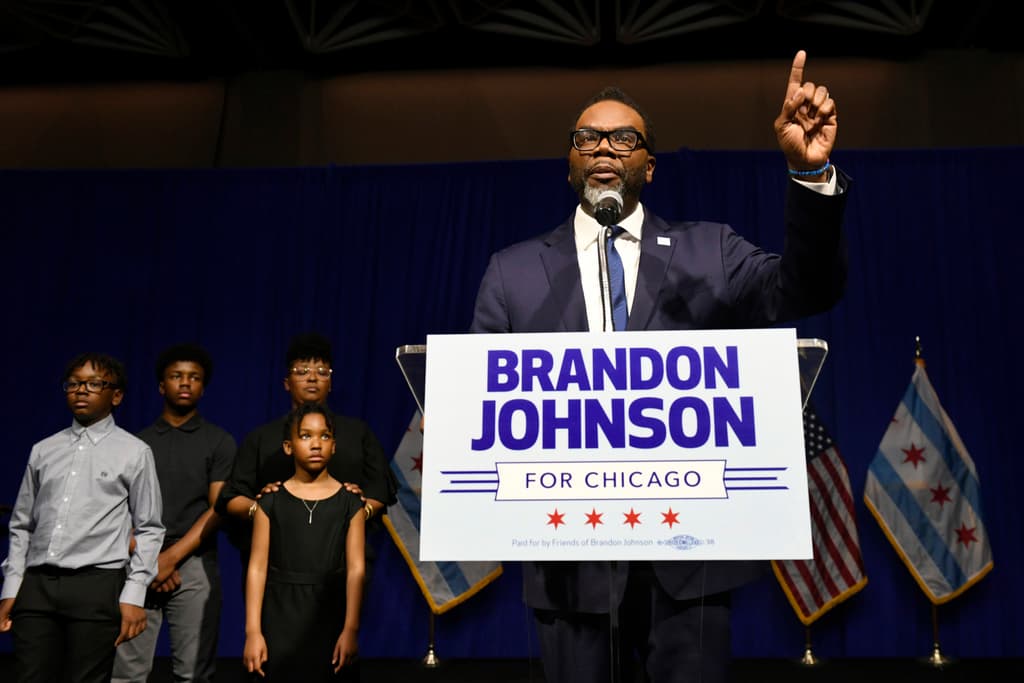Chicago’s Mayor Wants To Open a City-Owned Grocery Store for ‘Food Equity,’ as Walmart, Other Grocers Plagued by Thefts Flee Troubled Neighborhoods
Mayor Johnson should take a lesson from Boris Yeltsin’s 1989 visit to a Houston area grocery store, which cemented the then-mayor of Moscow’s belief that the Soviet state-run economy was hurting Russians.

Chicago’s mayor, Brandon Johnson, is planning to open a municipally owned grocery store to promote “food equity” in the city’s poorest neighborhoods.
At least six grocery stores have closed on the city’s South and West sides — predominantly minority neighborhoods — in the last two years, according to a statement from the mayor’s office. Mr. Johnson announced a partnership with a nonprofit, the Economic Security Project, to explore opening a city-owned grocery store with the goal of “repairing the harms that have contributed to purposeful disinvestment and exclusion and lack of food access in historically underserved communities.”
This announcement comes on the 34th anniversary of Boris Yeltsin’s 1989 visit to a Houston area grocery store, when the then-mayor of Moscow marveled at the food selection — a direct contrast to food lines and shortages in the Soviet Union. Yeltsin later said the American grocery store visit cemented his view that the Soviet state-run economic system was hurting Russians.
The Berlin Wall fell two months later. When Yeltsin was elected the first president of Russia in 1991, he pushed for large-scale privatization and opened the country to a capitalist market economy.
In Chicago, though, the city government seems to be following the adage, “If you don’t succeed, try try again,” rather than Winston Churchill’s proclamation, “Those that fail to learn from history are doomed to repeat it.”
“My administration is committed to advancing innovative, whole-of-government approaches to address these inequities,” Mr. Johnson said. “All Chicagoans deserve to live near convenient, affordable, healthy grocery options. We know access to grocery stores is already a challenge for many residents, especially on the South and West sides.”
Mr. Johnson advanced his city-owned grocery store proposal on the same day he announced a projected half-billion-dollar budget shortfall for the city in 2024. A city grocery store, meanwhile, will be funded by taxpayers and is unlikely to make a profit where private businesses failed.
In April, Walmart announced it was closing four of its eight Chicago stores, three of which were on the South and West sides. “These stores lose tens of millions of dollars a year, and their annual losses nearly doubled in just the last five years,” Walmart said in a press release.
The announcement came as a reversal for Walmart, which had highlighted its investments in Chicago’s Black neighborhoods as a “critical part” of advancing racial equity after the killing of George Floyd in 2020. “Chicago will be an example of what’s possible when we leverage business, government, and community organizations for the good of all,” Walmart’s chief executive officer, Doug McMillon, said in 2021.
Target closed two of its Chicago stores in 2018. Whole Foods closed its South Side store in 2022, despite $13.5 million in federal tax credits and the city devoting $10.7 million in tax-increment financing to bring the organic grocery chain to the historically Black neighborhood.
Mr. Johnson is correct that “food deserts” are a problem. In August, the Illinois governor, J.B. Pritzker, signed a bill allocating $20 million in grants to private and nonprofit grocery stores in areas that lack them or are in danger of losing them. Mr. Johnson, though, wants to take government involvement in the grocery business to a whole new level.
Chicago has long been plagued by high crime, particularly in the neighborhoods in question. Retail theft is also a major problem for the city, with Walmart and Macy’s topping the list for theft arrests. The Illinois chamber of commerce estimates that more than $2 billion worth of goods was stolen from retailers in 2021. Retail theft is a growing national problem.
The number of arrests for retail theft in Chicago, though, started to decline drastically in 2020. One suspected reason is that Cooke County’s district attorney, Kim Foxx, raised the threshold for felony theft to $1,000 from $300.
Yet Mr. Johnson doesn’t mention these concerns in his proposal — instead, the problem is all “disinvestment” and the solution all about “equity.” A senior advisor for the Economic Security Project, Ameya Pawar, says a city-owned grocery store will be “not dissimilar to the way a library or the postal service operates.”
“The City of Chicago is reimagining the role government can play in our lives by exploring a public option for grocery stores,” Ms. Pawar said.
The United States Postal Service reported a loss of $1.7 billion in just the first quarter of 2023, according to the Government Accountability Office. Not a great omen for Chicago taxpayers.

